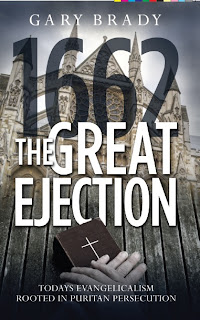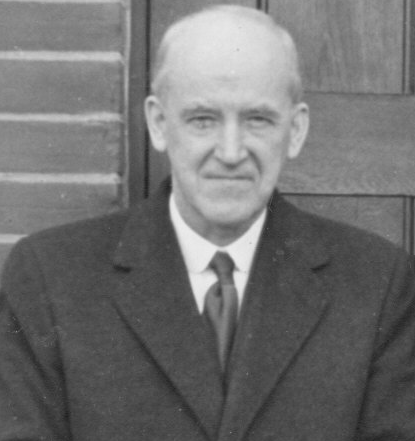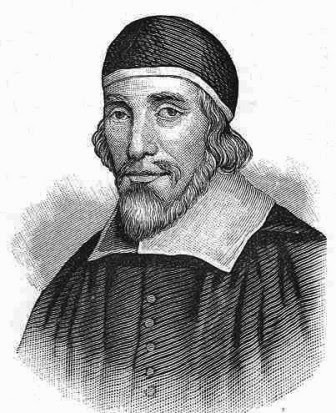WILLIAM JENKYN, MA
The massive stone tomb of William Jenkyn will readily catch the visitor's eye, as it lies only a little to the southeast of Thomas Goodwin's. The original inscription on this tomb was in Latin, but was replaced by an English one, now undecipherable, which was as follows: —
"Sacred to the remains of William Jenkyn, Minister of the Gospel, who during the heavy storms of the Church was imprisoned in Newgate. Died a martyr there in the 72nd year of his age and the 52nd of his Ministry, 1684."
This "martyr of Jesus" was born at Sudbury, Suffolk, in the year 1612, and was blessed with godly parents. That his father was a good man is clear, for he had already sacrificed all prospects of wealth and honour rather than yield obedience to laws, rites and doctrines which he deemed unscriptural. Indeed, so exceedingly enraged was his own father at his turning from the path which led to the highest positions in the Church of England, that he disinherited him. This cruel action of William Jenkyn's grand-father, however, had no effect, for his father became the minister at Sudbury, where God was pleased to smile upon his labours. The mother of Jenkyn was a grand-daughter of noble John Rogers, who was burned to death in the reign of that poor misguided but cruel daughter of Rome known as "Bloody Mary." When William was still quite young his father died, and his mother somewhat reluctantly agreed to trust him to the care of his paternal grandfather, who was willing to educate him and to train him as a gentleman. After the lad had been with his grandfather for a few years, fearing that the godless habits of those with whom he lived would have an ill effect upon him, his mother, like a wise woman, took "William under her own care, and with her second husband trained him up after a godly manner. In 1626 arrangements were made for him to go into residence at Cambridge, the College chosen being that of St. John's, and his tutor was Anthony Burgess, who found him an apt pupil. Indeed, he made such progress in his studies that his fame spread abroad, but best of all his mind was exercised concerning his spiritual standing. His walk, conversation, and conduct alike proclaimed him to be a godly character, and he was mercifully preserved from falling into those outward sins of dissipation and vice which ruin so many young men. Having taken his MA degree, he accepted a lectureship at St Nicholas Acon, London, but soon after moved to Hythe in Essex, where he preached to a small congregation.
A number of his friends, being desirous of sitting under his ministry, persuaded him in 1641 to return to the Metropolis, where he became vicar of Christ Church, Newgate, and afterwards he was also appointed lecturer of St. Anne's, Blackfriars. He laboured with much earnestness and success, but his political views brought him into trouble at the overthrow of the Monarchy. So thankful were the people at being freed from the hateful yoke of the Stuarts, that Parliament appointed special thanksgiving services, but Jenkyn, whilst a stalwart Puritan, refused to take part in these. As a consequence he was banished from London, suspended from his ministerial office, and his benefices were sequestrated. He removed to Billericay, in Essex, for some six months ; then returned to London, only to be sent to the Tower for taking some little part in a foolish plot. On the advice of friends he afterward petitioned Parliament for his release, although it was a difficult matter for those interested in him to obtain his signature to the document. It is pleasing to relate that it was resolved to pardon Jenkyn "both for life and estate," and he was thus free not only to return to his home, but also to his ministry. Showing a very magnanimous spirit he refused to eject the Mr. Feak who had been appointed to Christ Church, but an early morning lectureship was arranged, and a large subscription was raised for this purpose. He also recommenced his lectures at Blackfriars, and on the death of Dr. Gouge he was chosen rector. When afterwards Mr. Feak was dismissed by the Government, Jenkyn was reappointed by the Governors of Bartholomew's Hospital, and thus once again he became vicar of Christ Church. Each Lord's Day he preached morning and evening to large auditories, for in addition to his parishioners, people flocked from all parts to listen to this prince of preachers. He possessed very considerable abilities, and was called by Baxter, **that elegant and sententious preacher." When the deceived and foolish people made another Stuart, Charles the Second, King of England, Jenkyn's troubles began again.
On Tuesday, January 2nd, 1661, he was compelled to appear before a special council, where he " was reproved for not praying for the King." When afterwards the Uniformity and Oxford Acts in 1662 and 1665 were passed, Jenkyn could not take the oaths that were required; and once again he sacrificed his living, retiring to Langley in Hertfordshire, where he preached to a few friends in private. When the King issued a Declaration of Indulgence in 1671, he returned to London, and a chapel was erected for him in Jewin Street, where once again great numbers of people sat under his ministry. The Indulgence was not confirmed by Parliament, and was withdrawn ; but although not immediately, Jenkyn's sorest trial was fast approaching. As was only to be expected, Jenkyn declined to conform, and from that time he was '* in dangers oft," for although the King decreed, this man and hundreds of others refused to have their voices silenced, and continued to preach under the most adverse circumstances. Meetings were held in secrecy as often as possible until September 2nd, 1684, when he was apprehended by soldiers, who broke in upon the numerous company which had met for prayer. With the exception of Jenkyn, all the ministers, amongst whom were Reynolds and Flavel, escaped, the latter stating that it was a piece of foolish vanity on a lady's part, combined with an act of politeness by the famous preacher, that cost him his liberty. In the rush for safety Jenkyn stood aside to allow this lady to pass before him, and her long train only too effectually prevented his hastening down the stairs and reaching a place of safety. The officers were delighted at their capture, and treated the aged and venerable servant of God in as cruel and rude a manner as possible, whilst the two magistrates, who were mere tools of the Court, were exceedingly violent and unjust. According to the law, by the payment of £40, the offender could obtain his release, but these creatures set all order at defiance, and committed the preacher, now 71 years of age, to Newgate Prison, where most severe restrictions were imposed. What mattered it that this much loved and highly respected man had suffered greatly for the Royalist cause ? What cared his persecutors that the foul air and stench of Newgate would surely poison him ? What anxiety did the statement of Jenkyn's physician that "his life was in danger from close confinement " cause the evil king and his counsellors ? What effect had all the pleadings of his friends and petitions of his followers ? Answers to these questions are found in the regulations by which Jenkyn was bound. He was not allowed to pray with anyone—not even his daughter. He was never permitted to leave the prison, although full security was offered, and neither was he granted the ordinary rights of a prisoner. It is not to be wondered that his physical health soon began to fail, although as his natural strength decayed his spiritual powers seemed to increase. On one occasion he exclaimed to some of his friends, " What a vast difference is there between this and my first imprisonment ! Then I was full of doubts and fears, of grief and anguish; and well I might, for going out of God's way and my own calling to meddle with things that did not belong to me. But now being found in the way of my duty, in my Master's business, though I suffer even to bonds, yet I am comforted beyond measure. The Lord sheds His love abroad in my heart ; I feel it ; I have the assurance of it." Some of his loving hearers giving way to tears, he exclaimed, "Why weep ye for me? Christ lives; He is my Friend ; a Friend born for adversity; a Friend that never dies. Weep not for me, but weep for yourselves and for your children." On January 19th, 1684, after some four months' confinement, Jenkyn exchanged a prison cell for a heavenly mansion. In the former he suffered privation, persecution, hunger, thirst, and a thousand indignities, but in heaven all these things were done. The prison doors were kept securely fastened, but it is recorded of the Celestial City, " The gates of it shall not be shut at all by day ; for there shall be no night there."
For fifty years he had been a minister of the Gospel
upon the earth, faithfully rebuking sin and setting forth
Christ as the one hope of a sinner and the only way to the
Father, but now he "sees Him as He is," and is joining
in the song of the redeemed from among men.
It was not long ere the news of his death reached the
court, and one courtier was bold enough to say to the
King, "May it please your majesty, Jenkyn has got his
liberty." With surprise the monarch replied, "Aye, who
gave it to him ?" "A greater than your Majesty, the
King of kings," was the explanation, and even so callous
and perfidious a man was for once silent.
To Bunhill Fields the mortal remains of Jenkyn were
taken, "his corpse being attended by at least one hundred
and fifty coaches," and were there laid to rest. He was
undoubtedly a martyr, for in Newgate, as he stated, "a
man might be as effectually murdered as at Tyburn;" and
his daughter boldly gave mourning rings with the inscription, "Mr. William Jenkyn murdered in Newgate." As a
politician Jenkyn is not easily understood, for he seemed
to change his views quickly and often, but this compared
with eternal matters is of small moment.
His great work is an exposition upon the Epistle of
Jude, which was preached in Christ Church. A revised
and corrected edition was published in 1839, the editor
being Mr. James Sherman, who was then the minister
of the Surrey Chapel.
The extract given is from Jenkyn's sermon on the
afternoon of August 17th, 1662, before he was ejected.
The text was Exodus iii. 2-5.
"Lastly, to name no more, labour to preserve the holiness
of God's true institutions, those things which are of divine
consecration. What is human consecration without divine
institution? The sabbath day is of divine institution, labour
to keep it holy ; this is a holy day indeed, and this labour to
keep your families from profaning' of ; but for other holy days,
and holy things, they are much alike for holiness; the Lord's
day is a holy day indeed, and for shame do not let your
children gad abroad on this day. Truly I do verily believe,
that though here be a great company of people in the congregation,
yet they are but a handful in comparison of what
are drinking in ale-houses, and walking in the fields, that one
can hardly get home to their house for the crowd of the people
that are going thither. For shame let not this be told in
Gath, nor published in Askelon. What ! shall we stand up
for the holiness of places, and yet oppose the holiness of the
Lord's day, which God hath enjoined and instituted ? Oh!
that the magistrates of London - oh! that England's king - oh! that England's Parliament would do something for the
reformation of this, to oppose wickedness and profaneness which
will otherwise bring upon us the judgements of Sodom and
Gomorrah, and make us guilty and worthy of a thousand
punishments. And labour by prayer in your families to overcome
that flood of profaneness, which you cannot by your
strength prevent. And then for the Lord's message and Word,
that is a holy thing, and therefore love His messengers : the
messengers of God delivering His message with fear and
reverence, you are to hear them with the same fear, reverence,
and resolution to be holy, as if Christ were present. And
for the Word of God, it is not enough for you to have a
choice sentence written upon the walls of your churches, but
let God's law be written in your hearts and consciences, and
practised in your lives, that all the world may see that you
live as men dedicated to the true God, in all the duties of His
ways and obedience. Many of these things might have been
enlarged. What I have given you with the right hand, I pray
you Christians, do not take with the left ; for if you do, you will
make yourselves guilty of a double sin. First, because you do
not obey the truth you hear. And secondly, for putting a
wrong construction upon it. But I have better hopes of you,
my beloved hearers, and hope that the Lord will be better
unto your souls than His ministers, than His Word, or any
thing else can be. God bless you and His ordinances, and discover
His mind and will at this time to you."





















.jpg/220px-Thomas_Watson_(Puritan).jpg)
